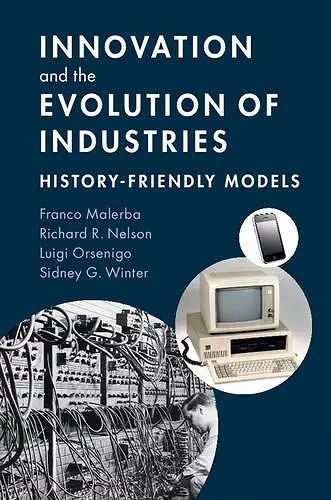Innovation and the Evolution of Industries
History-Friendly Models
Franco Malerba author Richard R Nelson author Luigi Orsenigo author Sidney G Winter author
Format:Paperback
Publisher:Cambridge University Press
Published:11th Aug '16
Currently unavailable, and unfortunately no date known when it will be back
This paperback is available in another edition too:
- Hardback£86.00(9781107051706)

A new approach to the analysis of technological process, emphasising the tailoring of formal modelling to historical context.
This book will interest scholars and graduate students of innovation and industrial evolution, from diverse backgrounds such as economics, history and management, and also practitioners of business strategy and economic policy. It offers a new methodology for studying the complex dynamics of innovation, competition and industrial evolution.The disruptive impacts of technological innovation on established industrial structures has been one of the distinguishing features of modern capitalism. In this book, four leading figures in the field of Schumpeterian and evolutionary economic theory draw on decades of research to offer a new, 'history-friendly' perspective on the process of creative destruction. This 'history-friendly' methodology models the complex dynamics of innovation, competition and industrial evolution in a way that combines analytical rigour with an acknowledgement of the chaotic nature of history. The book presents a comprehensive analysis of the determinants and patterns of industrial evolution, and investigates its complex dynamics within three key industries: computers, semiconductors, and pharmaceuticals. It will be of great value to scholars and students of innovation and industrial change, from backgrounds as varied as history, economics and management. Its coverage of new methodological tools is also useful for students who are new to evolutionary economic theory.
'This book offers welcome advancements to the understanding of industrial dynamics as innovation-driven evolutionary processes. Over the last forty years or so, major progress has been made both in the identification of relatively general 'stylized facts' of industrial evolution and in their account by means of evolutionary models. Much less has been done toward bringing formal theories to the specificities of particular industry histories. This is what this work does, using phenomenologically very detailed models as a sort of coherent thought experiment on the causal mechanisms, yielding the specific features of the histories of the computer, semiconductors and pharmaceutical industries. To be read by history-inclined scholars generally skeptical about any formalization. And to be read by modelers often weary of qualitative histories.' Giovanni Dosi, Scuola Superiore Sant'Anna, Pisa
'Four of the world's leading evolutionary economists have combined to build this new and exciting bridge between economic theory and history. Every scholar who is interested in innovation, research and development, competition, and industrial organization will want to cross this bridge. Many will find here important challenges for their future work in economic and business history as well as economics.' Louis Galambos, Johns Hopkins University
'The co-authors of this volume are pioneers in the development of 'history-friendly models' of the evolution of knowledge-intensive industries. This book extends and elaborates that work, enriching our understanding of the development of the computer, semiconductor, and pharmaceuticals industries. The volume is a major contribution to economics, strategy, and policy.' David C. Mowery, William A. and Betty H. Hasler Professor of New Enterprise, Emeritus, University of California, Berkeley
ISBN: 9781107641006
Dimensions: 228mm x 152mm x 16mm
Weight: 420g
292 pages